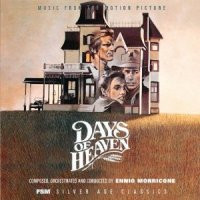- Composed by Ennio Morricone
- Film Score Monthly / 2011 / 116:59
It’s hard to describe the plot of Days of Heaven without making it sound like a relatively asinine love story, so I won’t. But it’s a film made by Terrence Malick – so the plot is pretty much incidental. During filming he chopped out most of the dialogue, shot the film very quickly, then spent a year and a half editing it (during which time he recorded 60 hours of potential narration by actress Linda Manz, of which approximately a quarter of an hour ended up in the film). One look at the film is all it takes for a certain sort of person to immediately fall in love with it – it is truly, staggeringly beautiful, shot by Malick almost exclusively during “magic hour” as the sun casts its final golden glow across the land; virtually every frame could stand alone as a work of art.
Malick’s recent films (he took two decades to make another one after Days of Heaven, but has now made three in just over a decade, and more are on the way) have inspired some wonderful music from three very different film composers, Hans Zimmer, James Horner and Alexandre Desplat, but all laboured very hard and saw their work go unused to a large extent (there’s a lot of Zimmer in The Thin Red Line, of course, but even so that’s just a fraction of the vast amount of music he recorded). In many ways, Ennio Morricone seems the perfect composer for Malick – used to working for directors who want music which can be placed all around the film rather than directly scoring to picture, but also able to write the kind of organic music of naturalistic beauty that is so ideal for the great director’s films.
The Italian composer did actually score to picture, but did so fully aware that the music was going to be moved around all over the place in the film. Indeed, Malick famously used “Aquarium” from Saint-Saëns’s “Carnival of the Animals” over the film’s opening. Interestingly, Morricone’s main theme for the film clearly references that piece, though it goes off in its own direction very early on. Its undulating nature, its intense wash of strings, are so perfect for this film – reflective, calm, a slightly detached inevitability about the nature of life – it’s the film, in a nutshell.
The love theme is hardly less beautiful. A circular melody – not entirely dissimilar to the main theme from his rejected score for What Dreams May Come, 20 years later – it is an enrapturing, mesmerising piece. A third theme, “Happiness”, more than lives up to its name, being an uplifting melody usually heard for solo flute which scores the film’s sunniest moments. Much of the score is built from these three themes – and Morricone does so much with them. The solo piano versions of the main theme, for instance, are simply sumptuous.
There are some individual pieces not built from those themes which are also more than worthy of attention, primarily the lengthy “The Fire”, which accompanies a tragic sequence of events beginning with the attack by a plague of locusts on the farm at the centre of the film (one of many biblical references), culminating in a devastating fire. It’s vintage Morricone suspense – urgent, desperate, uncomfortable.
The score received a vinyl release at the time of the film and garnered Morricone his first Oscar nomination. On CD, it was issued on an Italian label with horrendous sound quality a long time ago (paired with the completely unrelated Two Mules for Sister Sara). Now, Film Score Monthly has put out a truly luxurious release, replicating the original album (including some non-Morricone music) but then presenting two alternative programmes, one featuring the music as heard in the film and the other, which occupies the second disc, offering a reasonably complete picture of what the composer wrote. What had always seemed to be a masterful work is now revealed to be something even greater. What Morricone wrote for Days of Heaven is simply magnificent – a musical portrait of nature, of life. I have never heard a more beautiful film score. This is the finest soundtrack album of 2011 and the finest of all the albums to have been put out by the sadly-departing Film Score Monthly. Days of heaven, indeed. *****












Thanks for your review, James. While I would be hard pressed to pick a single best FSM release, this one is certainly in the running. I’m not the world’s biggest Morricone fan but I’m over the moon with this score and played it endlessly when it arrived.
Take care and happy holidays.
Chris.
Wow, wow, wow. I’ve heard you singing this scores praises before, but this review is what finally does it for me. This is the next score I will purchase.
I completely agree with James’ review. One of the Maestro’s most beautiful scores and one of the best releases in 2011.
If you love Morricone’s melodic, lyrical, romantic music, you won’t be disappointed.
This review made me buy the CD. Thank you, James! 🙂
It’s a true gem, that’s what it is 🙂
Due to the Oscar season I reviewed Maestro Morricone’s first Oscar nomination and a true gem of a film score: http://italoscores.blogspot.com/2017/02/need-for-drama-part-5.html
Wow! A great analysis of this magnificent MORRICONE masterpiece. It’s essential to buy FSM’s 2 CD version as it expands on the love theme… this love theme that is just exquisite… and the variations allow one to experience its beauty and emotive power over and over again. “And the Oscar goes to GIORGIO MORODER” for ‘Midnight Express”– inconceivable and unfair! And yes, I enjoy MORODER’S synths and rock beat music, but for ENNIO’S brilliant score to be overlooked is shameful. Hollywood and its Awards will always be the subject of heated debates!